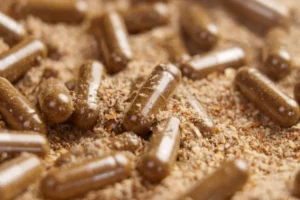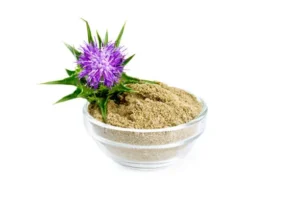
Milk Thistle Supplements: A Comprehensive Guide to Liver Health

Milk thistle supplements have gained significant popularity in recent years due to their potential health benefits, particularly for liver health. Derived from the plant Silybum marianum, milk thistle has been used for centuries as a natural remedy for various ailments.
Table of Contents
Milk Thistle Supplements
In this comprehensive guide, we will delve into the properties, benefits, potential side effects, and dosage recommendations of milk thistle supplements. Whether you’re looking to improve your liver function or explore alternative remedies, this article will provide you with all the essential information you need.
History and Background of Milk Thistle

Milk thistle, also known as Silybum marianum, has been used for centuries in traditional medicine for its potential health benefits. Native to the Mediterranean region, this flowering plant was traditionally used to treat liver and gallbladder disorders. The active compound in milk thistle, silymarin, was discovered in the 1960s and has since become the subject of numerous studies exploring its therapeutic properties.
Active Compounds and Mechanisms of Action

Milk thistle owes its health benefits to a group of flavonoids called silymarin, which is a combination of several active compounds. Silymarin acts as a powerful antioxidant and exerts its effects by stabilizing cell membranes, scavenging free radicals, and modulating inflammatory responses. Furthermore, silymarin promotes liver cell regeneration and inhibits the binding of toxins to liver cells.
Health Benefits of Milk Thistle Supplements

- Liver Health and Detoxification:
Milk thistle supplements are most renowned for their positive effects on liver health. The liver plays a crucial role in detoxification, metabolism, and overall well-being. Silymarin in milk thistle supports liver function by protecting liver cells from damage, promoting the regeneration of liver tissue, and aiding in the detoxification process.
- Liver Disease and Conditions:
Research suggests that milk thistle supplements may have potential benefits in managing certain liver diseases and conditions. Studies have shown that milk thistle may be beneficial in conditions such as alcoholic liver disease, non-alcoholic fatty liver disease (NAFLD), hepatitis, and cirrhosis. While more research is needed to establish definitive conclusions, the antioxidant and anti-inflammatory properties of milk thistle may help reduce liver inflammation and protect liver cells from damage.
- Antioxidant and Anti-inflammatory Properties:
The antioxidant and anti-inflammatory effects of milk thistle are not limited to the liver. Silymarin has been found to scavenge free radicals throughout the body, reducing oxidative stress and inflammation. This may have a positive impact on various conditions associated with chronic inflammation, such as cardiovascular disease, arthritis, and certain types of cancer.
- Diabetes and Blood Sugar Regulation:
Milk thistle has shown potential in helping manage diabetes and regulating blood sugar levels. Studies have demonstrated that silymarin may improve insulin sensitivity, increase glucose uptake by cells, and reduce the risk of complications associated with diabetes. However, it is important to note that milk thistle should not replace standard diabetes management strategies, and consultation with a healthcare professional is essential.
- Cholesterol and Heart Health:
High cholesterol levels are a significant risk factor for heart disease. Some research suggests that milk thistle supplements may help reduce LDL cholesterol (“bad” cholesterol) and triglyceride levels, while increasing HDL cholesterol (“good” cholesterol). These effects, combined with its antioxidant properties, make milk thistle a potential adjunct in promoting heart health. However, more studies are needed to confirm these findings.
- Cancer Prevention and Treatment:
Although further research is required, preliminary studies have explored the potential of milk thistle in cancer prevention and treatment. Silymarin exhibits anti-cancer properties by inhibiting the growth and spread of cancer cells, inducing apoptosis (cell death), and reducing the toxic effects of chemotherapy. However, it is important to note that milk thistle should not be used as a replacement for standard cancer treatments, and consultation with an oncologist is crucial.
Usage and Dosage Recommendations

- Types of Milk Thistle Supplements:
Milk thistle supplements are available in various forms, including standardized extracts, capsules, tablets, tinctures, and teas. Standardized extracts containing a high concentration of silymarin are the most commonly used form as they ensure consistent dosage and potency.
- Dosage Guidelines:
Dosage recommendations for milk thistle supplements can vary depending on the specific product, concentration of silymarin, and individual factors such as age, health condition and weight. It is crucial to follow the instructions provided by the manufacturer or consult with a healthcare professional to determine the appropriate dosage for your specific needs.
- Safety Considerations:
Milk thistle is generally considered safe for most people when taken in recommended dosages. However, mild side effects such as digestive issues (e.g., upset stomach, diarrhoea) can occur. Individuals with allergies to plants in the same family (such as ragweed) should exercise caution. Pregnant and breastfeeding women, as well as individuals with certain medical conditions or taking specific medications, should consult a healthcare professional before using milk thistle supplements.
Potential Side Effects and Precautions

While milk thistle is well-tolerated by most individuals, there are some potential side effects and precautions to consider:
- Mild Digestive Issues:
Some people may experience mild digestive issues, such as an upset stomach, bloating, or diarrhea when taking milk thistle supplements. These side effects are usually temporary and subside on their own. It is advisable to start with a lower dosage and gradually increase it to minimize the risk of digestive discomfort.
- Allergic Reactions:
Milk thistle belongs to the same plant family as ragweed and other daisies. Individuals with known allergies to these plants may be at an increased risk of allergic reactions to milk thistle supplements. It is important to discontinue use and seek medical attention if any signs of an allergic reaction, such as itching, rash, or difficulty breathing, occur.
- Drug Interactions:
Milk thistle may interact with certain medications, potentially affecting their efficacy or increasing the risk of side effects. Consultation with a healthcare professional is essential, particularly if you are taking medications for liver conditions, diabetes, cholesterol, or any other chronic health condition. They can provide guidance on possible interactions and adjust medication dosages if necessary.
- Pregnancy and Breastfeeding:
Limited research is available on the safety of milk thistle supplements during pregnancy and breastfeeding. As a precautionary measure, it is advisable for pregnant or breastfeeding women to consult with their healthcare provider before using milk thistle supplements to ensure the safety for both the mother and the baby.
Interactions with Medications

Milk thistle may interact with certain medications due to its potential effects on liver enzymes involved in drug metabolism. Some medications that may interact with milk thistle include anti-anxiety drugs, anticoagulants, antiviral medications, certain cancer drugs, immunosuppressants, and statins. It is important to inform your healthcare provider about any supplements you are taking to prevent any potential interactions or adverse effects.
Choosing and Buying Milk Thistle Supplements

When selecting milk thistle supplements, it is important to consider certain factors to ensure quality and effectiveness:
- Quality and Standardization:
Look for milk thistle supplements that are standardized to contain a specific percentage of silymarin, usually between 70% and 80%. This ensures consistent potency and allows for accurate dosage. Additionally, choose products that undergo third-party testing for quality and purity.
- Forms and Delivery Methods:
Consider the form and delivery method that best suits your preferences and needs. Capsules and tablets provide convenience and precise dosing, while tinctures and teas offer a more traditional approach. Select the form that aligns with your lifestyle and personal preferences.
Conclusion
Milk thistle supplements have gained popularity for their potential benefits in supporting liver health, managing certain liver conditions, and providing antioxidant and anti-inflammatory effects. While more research is needed to confirm these benefits, milk thistle is generally safe for most individuals when taken as directed. However, it is important to consult with a healthcare professional, especially if you have any underlying medical conditions or are taking medications. By considering the potential benefits, dosage recommendations, safety precautions, and choosing high-quality products, you can make an informed decision about incorporating milk thistle supplements into your health regimen.
In conclusion, milk thistle supplements offer a natural approach to liver health and may provide additional benefits for various health conditions. However, it is important to note that supplements should not replace a balanced diet, regular exercise, and other healthy lifestyle practices. Milk thistle supplements can be a valuable addition to a holistic approach to liver health and overall well-being.
When considering milk thistle supplements, it is crucial to choose high-quality products from reputable manufacturers. Look for standardized extracts with a high concentration of silymarin and ensure that the supplements undergo third-party testing for purity and potency.
Moreover, it is essential to consult with a healthcare professional, especially if you have any underlying medical conditions, are taking medications, or are pregnant or breastfeeding. They can provide personalized guidance and help determine the appropriate dosage and potential interactions.
Remember, while milk thistle supplements show promise in supporting liver health, they are not a cure-all solution. Maintaining a healthy lifestyle, including a balanced diet, regular exercise, and avoiding excessive alcohol consumption, is crucial for optimal liver function.
Incorporating milk thistle supplements into your health routine, alongside healthy lifestyle practices, may help support liver health, provide antioxidant benefits, and potentially assist in managing certain liver conditions. However, it is important to make informed decisions, prioritize safety, and seek professional advice when necessary.
By understanding the benefits, potential side effects, dosage recommendations, and precautions associated with milk thistle supplements, you can make an educated decision about integrating them into your wellness journey. Remember, the key to optimal health is a comprehensive approach that encompasses various factors, including diet, exercise, and overall lifestyle choices.
Disclaimer: The information provided in this article is for educational purposes only and should not be considered as a substitute for medical advice. Consult a healthcare professional before implementing any home remedies or making significant changes to your lifestyle.






